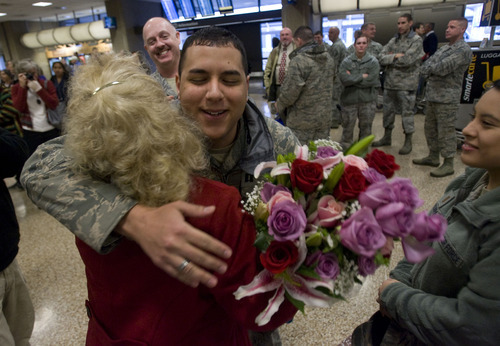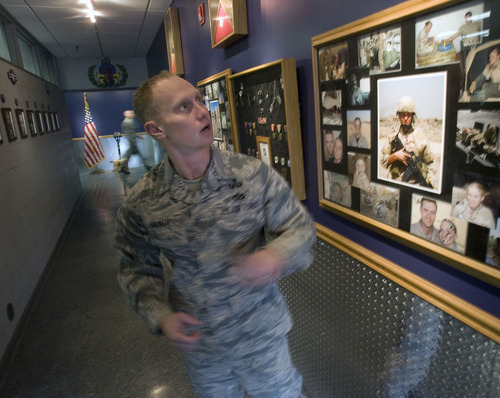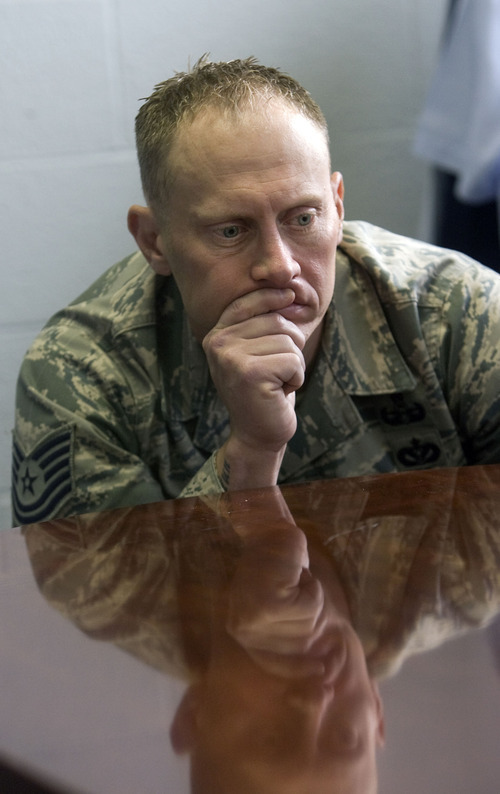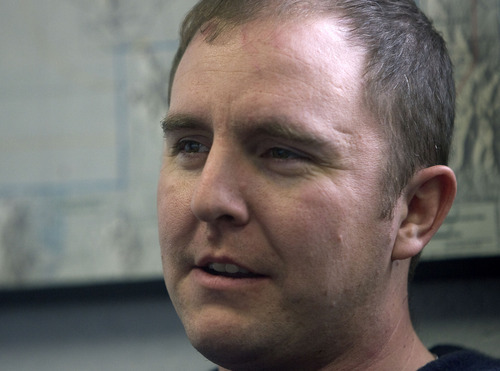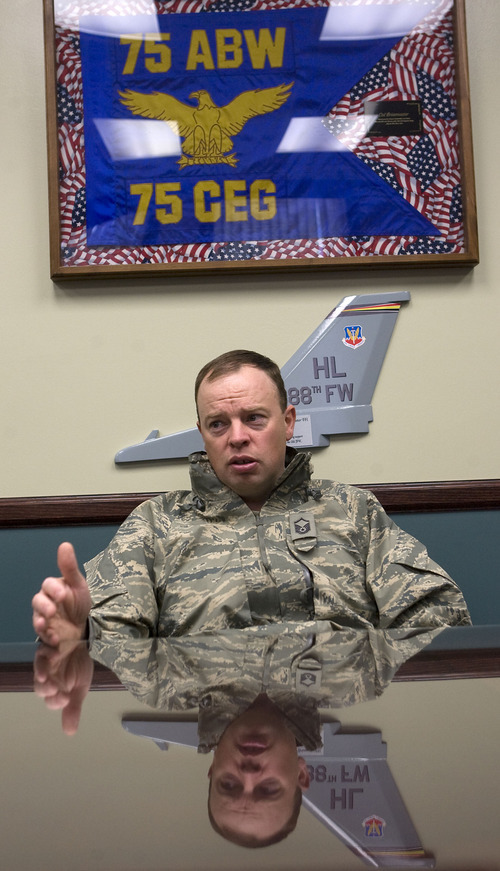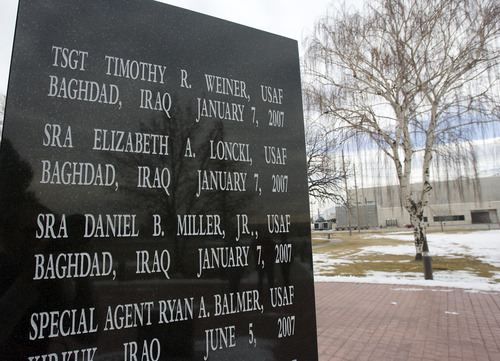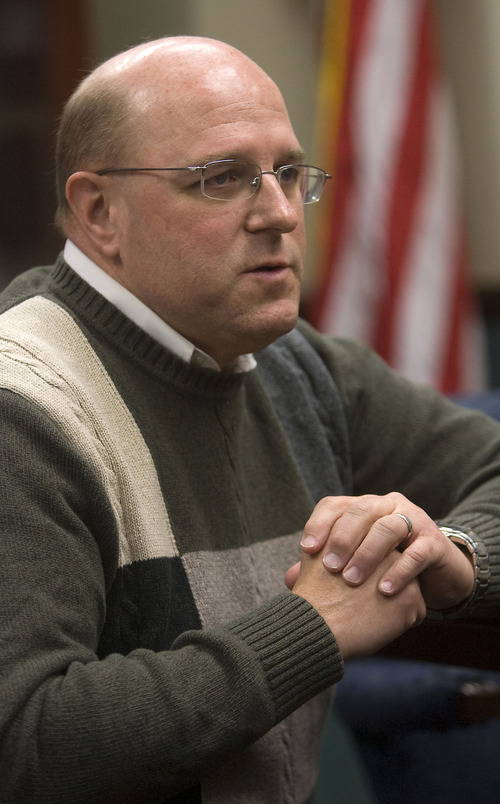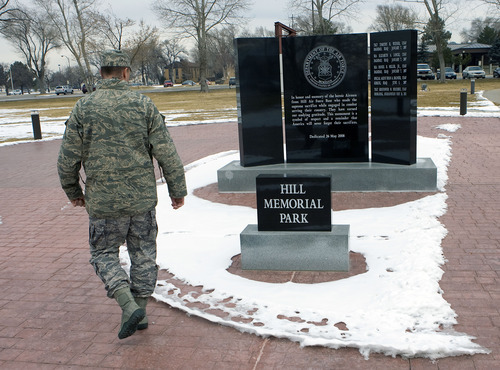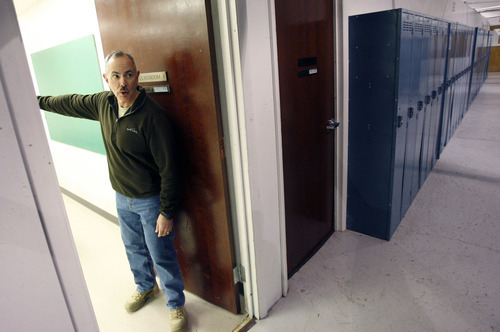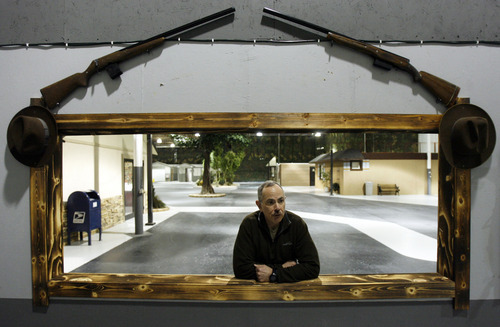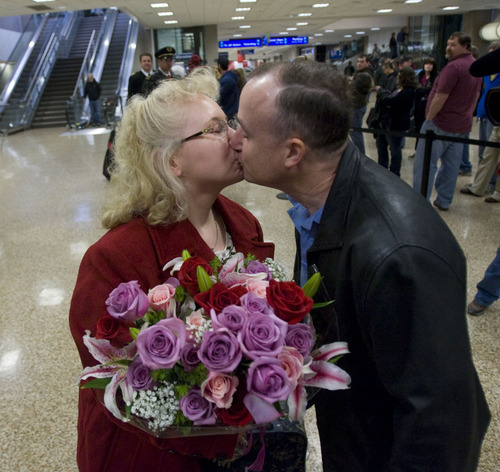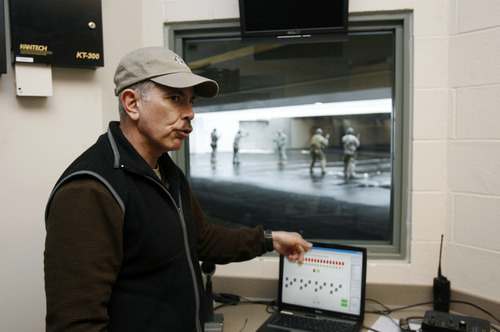This is an archived article that was published on sltrib.com in 2011, and information in the article may be outdated. It is provided only for personal research purposes and may not be reprinted.
Hill Air Force Base • The troops are home from Iraq, but the war is hardly over.
It's not over for veterans suffering post-traumatic stress and injuries, or for servicemen and women still fighting in Afghanistan. It's not over for taxpayers who bankrolled the fight, or for Iraqis trying to forge a democracy.
It's most certainly not over for those who lost people they love.
—
Disarming bombs • Jayson Johnson has one of the military's most dangerous jobs. He and other members of the 775th Explosive Ordnance Disposal (EOD) squad at Hill Air Force Base dismantle bombs and blow up weapons caches before they can hurt U.S. troops and their coalition partners.
Five years ago in January, Johnson buried his fiancée, Elizabeth Loncki, who died along with two of their 775th teammates.
Loncki, Timothy Weiner and Daniel Miller had just taken care of a suspicious rocketlike device under an abandoned car in Baghdad when insurgents detonated explosives sewn into the car's seats, killing all three.
"It's pretty bad, taking the woman you love to the church you were supposed to get married in and burying her," says Johnson, who has served in Pakistan and twice in Iraq and may go to Afghanistan next year. He wears Loncki's dogtag to this day.
The Air Force has roughly 900 airmen who are bomb-disposal technicians (the other branches also have them); Hill Air Force Base has 45 of them, the second-biggest flight in the service, says Steve Hallenbeck, a master sergeant with the flight.
In wars such as Iraq and Afghanistan, with no front lines and improvised explosives as the enemy's key weapon, the role of those who disarm the bombs is key. The Air Force has lost more bomb-disposal technicians, per capita, than any other type of airman, Hallenbeck says.
"Many of them have gone to Iraq four, five and six times," says retired Col. Harry Briesmaster, director of the 75th Civil Engineer Group. "It's not something you just go to once and say 'I've done it' and have the T-shirt for it. … They go, they come home for eight months and they're on the rotation again."
The 775th suffered another tragedy in May, when a fourth member, Kristoffer Solesbee, died in a roadside bomb attack in Afghanistan.
Within two days, his name was added to the black granite monument erected in a base park after Loncki, Weiner and Miller died. It also bears the name of Ryan Balmer, a HAFB airman with the Air Force Office of Special Investigations killed by an improvised explosive device on a road near Kirkuk, Iraq, on June 5, 2007.
The dead are not the only casualties.
Ben Wilhelm is 34 and has been on the bomb-disposal team for about a decade.
"I'll be on my seventh deployment next year and I need four joints replaced. I have six bulging discs from a helicopter crash. I'm deaf in my right ear," says Wilhelm, who had his first Christmas at home in Utah since marrying three years ago — and that was only because he's awaiting knee surgery.
"It destroys you in ways people don't realize," he adds. "These wars never end. It's never going to be over. You can pull out of Iraq, you can pull out of Afghanistan, there will always be someone to fight."
—
'Glad it's over' • On the day before Christmas, which would have been Clint Ferrin's 39th birthday, his parents, children and wife, who has since remarried, were at the Ben Lomond Cemetery in North Ogden.
They released red, white and blue balloons, as they do every year to remember Ferrin, an Army sergeant killed by a roadside bomb with two fellow soldiers on March 13, 2004, in Baghdad.
Rosemary Ferrin, Clint's mother, says his two children are thriving, especially now that their mother has remarried a "sweetheart of a husband," she said.
"At first it was hard; the pain, the memories," she said. "But he's fine where he is. He's doing what needs to be doing on the other side."
Ferrin says she was happy to see other young servicemen and women come home from Iraq to their families this month.
"I'm glad it's over with. I hate to see anybody else go through what we've gone through," she said.
Nonetheless, Ferrin hopes the bloodshed will not have been in vain. "The only thing that worries me about leaving is whether they will end up in the situation they were in before."
—
Will peace win out? • Iraq's future is also on the mind of Randy Watt, a colonel in the Utah Army National Guard and commander of the 19th Special Forces Group, which has 2,100 Green Berets in nine states.
Watt served three tours in the Middle East, first in Afghanistan for a year after the 9/11 attacks, then twice in Iraq. The year he spent as a counterterrorism adviser to Iraqi Security Forces, 2006 to 2007, left him sour.
Five servicemen he knew died, the war was being run badly and lives were being lost on pointless missions. Moreover, Iraqis did not seem to be stepping up and were angry that the American military could not stop the violence.
When he came home from that tour, he was able to help his Iraqi interpreter emigrate with his family to Utah.
By the time Watt returned to Iraq in 2010 — as chief of strategic plans for the counterterrorism effort — the situation had changed, he says, thanks to the leadership of Gen. David Petraeus.
The Iraqi special operation forces are now well trained. "They've come a long way. They are among the best in the Middle East," says Watt, who retired in October from the Ogden Police Department, where he was an assistant chief.
Watt returned from Iraq for the last time in July.
Part of him wishes the United States could have left a small force until 2014 to provide stability for the Iraqi military and police. It remains a volatile place with entrenched political factions.
"I have hope for the nation of Iraq. I have hope for the Iraqi people," says Watt. "But it will become what they decide and it could go either way."
—
So many lives lost • Margaret Williams, a staff sergeant from Hill Air Force Base who was on the last troop plane out of Iraq, says that while she was grateful for the rousing welcome home, she couldn't stop thinking about the costs of war: the servicemen and women she knew who died; other casualties she never met but for whom she arranged posthumous awards to be given at funerals.
Proud four-star generals and others greeted the troops when they reached Baltimore, but that prompted Williams to change into civilian clothes for the last leg of her journey home to Utah. She wanted to blend in.
"That's nice, but it was very difficult. I never forget, we lost over 4,500 people over there, and that was just the military."
The violence that erupted in Baghdad just days after the U.S. troop pullout only reinforced the tenuousness of Iraq's future. The U.S. military may have trained the Iraqi military well, but, as Williams says, "Most people agree it won't be up to the Iraq military as to whether they succeed. It's going to be up to the government."
"For me as a military member, that chapter is over," says Williams, who will retire in April after a career of nearly 23 years. "But it's very difficult knowing that a lot of people lost their lives."
Paying respects
On Jan. 7, the three airmen lost in Baghdad on Jan. 7, 2007, will be remembered in an evening ceremony at Hill Air Force Base's Hill Memorial Park. —
The Fallen
For a tribute to all Utah servicemen and women who were casualties of recent conflicts, go to http://extras.sltrib.com/thefallen/.


